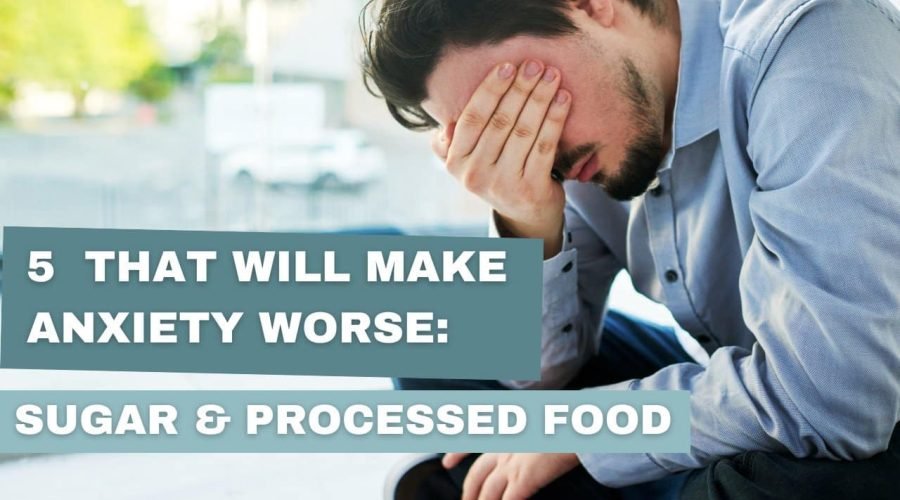For years, I battled severe anxiety, struggling to find relief and effective solutions. I was seeking help from health care practitioners, but no one addressed the impact of lifestyle choices on my anxiety. Instead, I received messages suggesting that my brain was “broken” or that past trauma would forever hold me back. The truth is, I found my way to recovery by understanding how the mind works and embracing real solutions. This is why I created this blog – to help you realize that you can overcome anxiety without years of struggle. In this article, we’ll explore five common habits that may be making your anxiety worse and preventing your recovery.
In today’s modern society, the overconsumption of sugar and processed foods has become an alarming trend. The convenience and addictiveness of these products have led to a significant rise in various health issues, including anxiety. Let’s delve into how these dietary choices can cause and worsen anxiety.
- Blood Sugar Spikes and Crashes: Highly processed foods and sugary treats cause rapid spikes in blood sugar levels. The initial surge may give you a temporary burst of energy, but it is often followed by a sudden crash. This rollercoaster ride of blood sugar levels can throw your biochemistry out of balance, leading to feelings of irritability, restlessness, and even panic, as the body struggles to regulate itself. These fluctuations can leave you feeling emotionally unstable and vulnerable.
- Gut-Brain Connection: Emerging research has highlighted the significant connection between the gut and the brain. The gut microbiome plays a crucial role in regulating mood and emotions. The overconsumption of sugar and processed foods disrupts the balance of gut bacteria, potentially leading to an increase in anxiety and mood disorders. Moreover, a compromised gut can hinder the production of neurotransmitters like serotonin, which is essential for maintaining emotional well-being.
- Inflammation and Oxidative Stress: Processed foods, especially those high in refined sugars and unhealthy fats, can trigger inflammation in the body. Chronic inflammation and oxidative stress have been linked to an increased risk of anxiety and depression. Consuming an excess of these foods over time can exacerbate these conditions, making it more challenging for you to cope with stress and anxiety.
- Nutritional Deficiencies: A diet heavy in sugary and processed foods lacks essential nutrients necessary for brain health. Nutrient deficiencies, particularly in vitamins and minerals like B vitamins, magnesium, and omega-3 fatty acids, can adversely affect mood regulation and contribute to anxiety symptoms. Inadequate intake of these nutrients will weaken your body’s ability to handle stress and can amplify your feelings of anxiety and unease.
- Addiction and Emotional Eating: Sugary and processed foods can be addictive, leading to a pattern of emotional eating. People may turn to these foods as a way to cope with stress and anxiety temporarily. However, the relief is short-lived, and the guilt and shame that follow can further aggravate anxiety symptoms, creating a vicious cycle of emotional eating and heightened anxiety.
- Sleep Disturbances: The consumption of sugar and processed foods, especially close to bedtime, can disrupt sleep patterns. As we previously discussed, poor sleep quality and insufficient sleep have a direct link to increased anxiety and heightened stress levels. When individuals fail to get enough restorative sleep, their ability to cope with daily challenges and manage anxiety diminishes.
To foster a healthy mind and body, it is crucial that you adopt a balanced diet that prioritizes whole, nutrient-rich foods while minimizing the consumption of sugar and processed products. By doing so, you will be taking a positive step towards increasing your emotional resilience.
And the last but not the least – Substance Abuse
